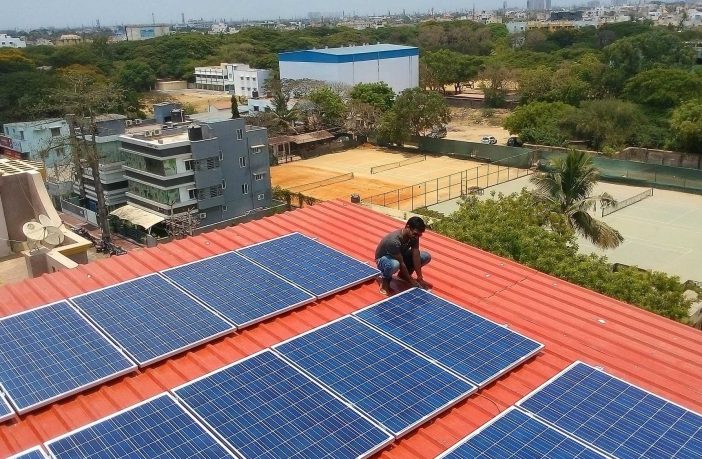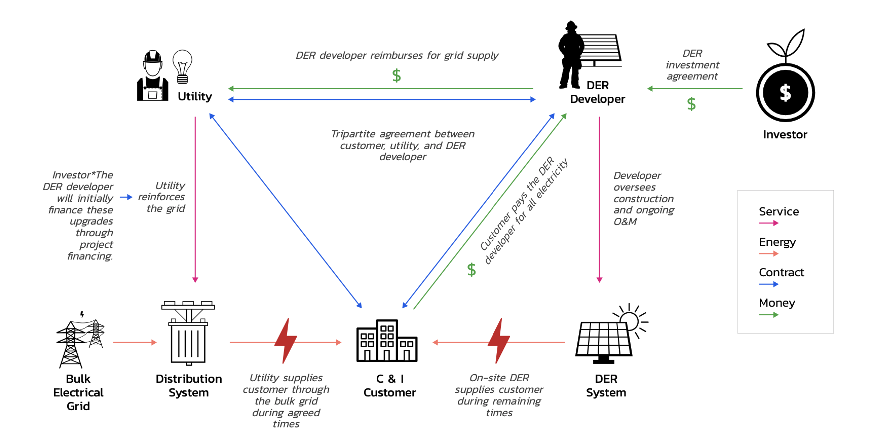- Daystar Power (“Daystar”, part of the Shell group) and RMI (founded as Rocky Mountain Institute), jointly released a U.S. Trade and Development Agency (USTDA)-funded feasibility study titled, “Scaling Utility-Enabled Distributed Energy Resources for Nigerian Commercial & Industrial (C&I) Customers”.
- The report introduces a groundbreaking business model designed for grid-connected hybrid solar power systems, with projections indicating the potential to unlock 3.3GW of solar capacity and attract $6.5 billion in investments.
- This study targets 170,000 corporations and industrial manufacturers in Nigeria, offering them substantial cost savings by transitioning from diesel-fired generators to utility-enabled solar systems with backup battery storage.
The study highlights the significant advantages of this new model, not only for C&I customers but also for electricity distribution companies (DisCos). By embracing utility-enabled solar systems, businesses can reduce energy costs, while DisCos stand to benefit from increased revenues through enhanced grid consumption and the connection of new customers to the grid.
“This feasibility study has been in the works for a long time, and we’re elated to announce its results. While Nigeria’s solar industry is taking off, it’s still relatively in its early days, and innovative studies like this are key to deepening the market and adding more value to the business community. We can provide even more affordable and reliable power to Nigerian businesses if we team up with distribution companies in close partnerships to solve challenges and eliminate uncertainties in the power value chain,” said Victor Ezenwoko, Daystar Power, Country Head of Nigeria and Ghana.
Pilot group results: C&I customers save on average 26% in energy costs, DisCos see up to 1,000% increase in profitability
In 2023, Daystar and RMI conducted Nigeria’s first-ever feasibility study to develop custom hybrid solar power systems that integrated with the national grid for 20 C&I customers in Abuja and Lagos, working in partnership with Abuja Electricity Distribution Company (AEDC), Eko Electricity Distribution Company (EKEDC), and Ikeja Electric (IE). The study found that 17 of the 20 customers saved on energy costs, with an average savings of 26%, while the project portfolio totaled 27 MW in new solar capacity and offset an estimated 25,000 metric tons in CO2 emissions. Under the model, DisCos’ profitability surged up to 1,000%. Among the 20 customers, The Wood Factory, an Abuja-based furniture manufacturer, became the first to reach close with an agreement signed with Daystar and AEDC on January 19, 2024.
”RMI is very proud to have de-risked a pipeline of projects at 20+ C&I customer sites and facilitated the contract signing of the first project of its kind in Nigeria. The business model exemplifies that unlocking sustainable grids and scaling distributed energy systems can go hand in hand and create win-win-win scenarios for customers, developers, and DisCos. It’s time for radical clean energy implementation, and we hope the project will lead to scaling distributed energy resources (DERs) in Nigeria to help improve reliability and reduce reliance on expensive, polluting fuels,” said Suleiman Babamanu, RMI, Nigeria Program Director.
Unique tripartite agreement to drive collaboration between the national grid and solar companies
The business model is based on a tripartite agreement between the customer, Daystar, and the DisCo. Daystar installs and operates a fully-financed hybrid solar system on behalf of Nigerian businesses to provide power supply during daytime peak hours (9 am to 3 pm). Meanwhile, the DisCos will extend hours of grid power to supply electricity to customers in the evening, night, and early morning hours (3 pm to 9 am). Backup batteries and generators mitigate against any grid outages and outperform generator-only backup systems in cost savings and reliability.
Illustration of the proposed utility-enabled C&I business model
Addressing grid infrastructure challenges
A majority of C&I customers face poor reliability from the grid due to blackouts resulting from a collapse in transmission and distribution networks. Given poor grid services, many customers depend on diesel-fired generators as a primary and backup power source and pay energy costs that are three times more expensive than grid tariffs. Over the last two years, diesel prices have surged in Nigeria, rising from 260 Naira per liter in 2021 to more than 800 Naira per liter in Lagos and 850 Naira per liter in Abuja at the time of the study in 2023. Under the tripartite agreement, Daystar will finance upfront grid infrastructure upgrades by deducting DisCo payments (see diagram). With support to solve persistent infrastructure gaps, DisCos have the incentives to prioritize grid supply to C&I customers.
Access the complete Scaling Utility-Enabled Distributed Energy Resources for Nigerian Commercial & Industrial (C&I) Customers study HERE.
Author: Bryan Groenendaal
















